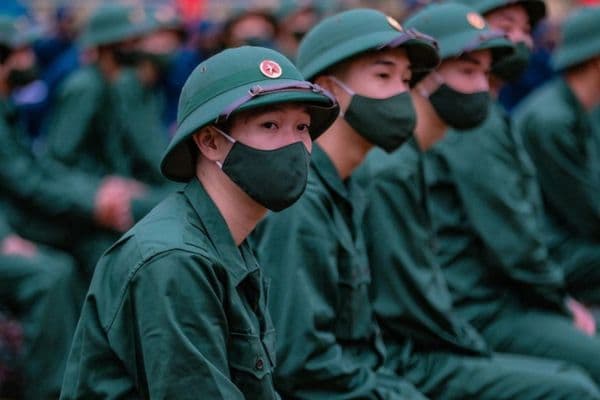Avoiding Military Service Obligations: Is Imprisonment a Consequence? Which Cases Exempt Citizens from Military Service?
Can evasion of military service obligations lead to imprisonment?
Pursuant to the guidelines in Section 11, Chapter I Official Dispatch 5887/VKSTC-V14 of 2019 and Clause 8, Article 3 of the Law on Military Service 2015, evasion of military service obligations is defined as non-compliance with:
- The order for military service registration;- The order for a health check for military service;- The order for enlistment;- The order for centralized training, drills, readiness for mobilization, readiness for combat, and is subject to administrative penalties.
However, Clause 1, Article 332 of the Criminal Code 2015 only stipulates criminal prosecution for the following three acts:
- Non-compliance with laws on military service registration;- Non-compliance with the order for enlistment;- Non-compliance with the order for centralized training; it does not stipulate criminal prosecution for non-compliance with the order for a health check for military service.
Therefore, criminal prosecution is only applied to the following three acts of evasion of military service obligations:
- Non-compliance with laws on military service registration;- Non-compliance with the order for enlistment;- Non-compliance with the order for centralized training; it does not stipulate criminal prosecution for non-compliance with the order for a health check for military service.
Non-compliance with the order for a health check for military service is not subject to criminal prosecution. The act of evading the military service health check only incurs administrative penalties in accordance with regulations.
 Can evasion of military service obligations in 2024 lead to imprisonment? In what cases are citizens exempt from military service in 2024? (Image from the internet)
Can evasion of military service obligations in 2024 lead to imprisonment? In what cases are citizens exempt from military service in 2024? (Image from the internet)
In what cases are citizens exempt from military service?
According to Clause 1, Article 41 of the Law on Military Service 2015, supplemented by Point c, Clause 1, Article 49 of the Law on Militia and Self-Defense Forces 2019, the cases for temporary deferment of enlistment include:
- Lack of qualifying health to serve in the military as concluded by the Health Check Council;- Being the sole worker directly supporting family members who are incapable of working or not of working age; suffering significant family losses in terms of people and assets due to accidents, natural disasters, or dangerous epidemics as confirmed by the commune-level People's Committee;- Being a child of invalids, or persons affected by dioxin with work capacity loss from 61% to 80%;- Having a sibling serving as non-commissioned officers, soldiers in active service; non-commissioned officers, soldiers fulfilling obligations in the People's Police;- Belonging to the group of migrants or resettlers within the first 3 years to particularly difficult communes as part of State economic-social development projects as decided by the provincial-level People's Committee or higher;- Officials and public employees, young volunteers assigned to work in regions with extremely difficult economic-social conditions as regulated by law;- Currently studying at general education institutions; undergoing full-time university education at higher education institutions, studying at full-time colleges at vocational education institutions during one training course;- Permanent militiamen
Citizens within the above categories are eligible for temporary deferment of enlistment in 2024.
Additionally, cases defined in Clause 2, Article 41 of the Law on Military Service 2015 are eligible for exemption from military service, including:
- Children of martyrs, children of grade one invalids;- A brother or sister of martyrs;- A child of grade two invalids, a child of beneficiaries of policies on invalids with a work capacity loss of 81% or more; a child of a person affected by dioxin with a work capacity loss of 81% or more;- People working in cryptographic work without being military personnel, People's Police;- Officials and public employees, young volunteers assigned to work in regions with extremely difficult economic-social conditions for 24 months or more as regulated by law.
Moreover, citizens in the category of temporary deferment will be called for enlistment if the reason for deferment no longer exists.
Citizens eligible for temporary deferment or exemption from enlistment may volunteer for military service and be considered for selection and enlistment.
How long is the military service?
According to Article 21 of the Law on Military Service 2015, the regulation is as follows:
Duration of Active Service for Non-commissioned Officers and Soldiers
1. The duration of active service during peacetime for non-commissioned officers and soldiers shall be 24 months.
2. The Minister of National Defense may decide to extend the duration of active service for non-commissioned officers and soldiers, but not exceeding 06 months in the following cases:
a) Ensuring readiness for combat;
b) Executing tasks of preventing and fighting natural disasters, epidemics, search, and rescue.
3. The duration of service for non-commissioned officers and soldiers in wartime or in a state of national defense emergency shall comply with general or partial mobilization orders.
Accordingly, the duration of active service during peacetime for non-commissioned officers and soldiers is 24 months.
The Minister of National Defense may decide to extend this duration for non-commissioned officers and soldiers for no more than 6 months under the following circumstances:
- To ensure readiness for combat.- During tasks of preventing and fighting natural disasters, epidemics, search, and rescue.
Thus, those serving in the military will do so for 24-30 months, with a maximum of 30 months if their service is extended, except in cases of war or a national defense emergency, which follow separate regulations.
This duration is calculated from the date of handover and reception of soldiers. If there is no centralized soldier handover, the duration starts from the date the military unit receives them until a discharge decision is issued by the competent authority.
* Note: The service duration for non-commissioned officers and soldiers in wartime or during a national defense emergency is implemented according to general or partial mobilization orders.
LawNet